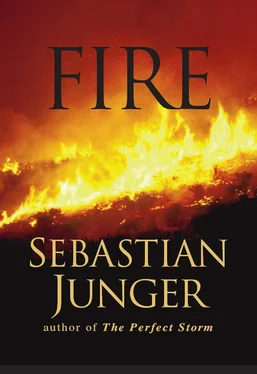We were worried about KLA snipers—stupidly, both of us were dressed in black, like the Serb secret police—but we were even more worried about Serb snipers. This was the heart of Drenica, an area the police can seal off but not control, an area the KLA can hide in but not defend. It was a no-man’s-land where you could get shot at or you could get invited in for tea, depending on who spotted you first.
We walked for an hour and finally came upon a dozen ethnic Albanians repairing the road. Since the Serb police controlled the highways, there seemed to be a lot of repair work being done on the spider web of dirt roads that connect the villages in Drenica. The men escorted us into one of their houses and sent someone ahead to ask the KLA commander at the next village if we could continue. We sat on the floor, drinking Turkish coffee and watching an American cop show on satellite television; after an hour the man came back and said apologetically that the answer was no, we could not continue. The KLA was not prepared to greet us.
When we stepped outside, we could hear the Serbs shelling some villages a few miles away. The sound rumbled over the hills like a summer rainstorm. As we studied the faces of the farmers around us—rough, unshaven faces of men who had known nothing but hard work their whole lives—it was impossible to tell if they understood what real war would mean. It was impossible to tell if they understood that tragedies like this happen every day, all over the world; that in all probability, no one was going to intervene on their behalf; and that the Serb authorities, like most governments, would stop at almost nothing to retain power.
In 1389, as the myth goes, Prince Lazar of Serbia was visited by St. Ilija in the form of a falcon. It was on the eve of a great battle with the Turks, and Lazar had gathered around him, on the plains of Kosovo, much of the Balkan military elite: Bosnian warlords, Albanian noblemen, and Hungarian horsemen with shamanic bones sewn onto their uniforms. Lazar was understandably nervous—the Turks had wiped out an entire Serb army eighteen years earlier—and wondered if it might not be better to retreat and fight again another day. St. Ilija gave Lazar the choice between a kingdom on earth and a kingdom in heaven; Lazar, wisely choosing the kingdom in heaven, went on to meet his death at the hands of the Turks.
The battle became known as the Battle of Kosovo Polje—the Blackbird Field—and it occupies a particularly fevered part of the Serb psyche. It was on Kosovo Polje that a Serb leader first chose death over subjugation; it was on Kosovo Polje that the guiding maxim of the Serb people, “Only unity saves the Serbs,” was first acted out in all its bloody glory.
Nearly six hundred years after the battle, Slobodan Milošević, the man responsible for igniting the entire Balkan conflict, would stand on the ancient battlefield and whip a crowd of angry Serbs into a nationalist frenzy. “Yugoslavia does not exist without Kosovo!” he yelled, instantly catapulting himself to the top of the political heap. “Yugoslavia would disintegrate without Kosovo!”
Kosovo is not the birthplace of the Serb people, however. The original Serbs migrated southward from Saxony and what is now the Czech Republic in the sixth century A.D. and didn’t settle permanently in Kosovo for another six hundred years. The high-water mark of the Serb empire came in the 1330s, when a brutal nobleman named Stefan Dušan defeated his own father in battle, had him strangled, and then went on to extend his empire throughout Kosovo and into Greece. He built numerous Orthodox monasteries and churches and eventually had himself crowned emperor of the Greeks, Bulgarians, Serbs, and Albanians.
The empire didn’t survive his own death, though; within decades the Turks defeated the Serbs at Kosovo Polje, and three hundred years after that the Turks put down another uprising so ruthlessly that most Serbs fled Kosovo. The void they left behind was filled by the Albanians, who drifted back down out of the mountains with their wild, hill people ways.
Traditional Albanian society was based on a clan system and was further divided into brotherhoods and bajraks. The bajrak system identified a local leader, called a bajrakar, who could be counted on to provide a certain number of men for military duty. In another era Adem Jašari and Ahmet Ahmeti might well have been considered bajrakars. That organization has fallen into disuse, but the clans—basically used to determine allegiances during a blood feud—seem to have survived.
Feuds in this part of the world inevitably break out over offenses to a man’s honor, which include calling him a liar, insulting his female relatives, violating his hospitality, or stealing his weapons. Tradition dictates that these transgressions be avenged by killing any man in the offender’s family, which creates another round of violence. As late as the end of the nineteenth century, one in five adult male deaths was the result of a blood feud, and in Albania today, it is said, a tradition still exists whereby you must kill one man for every bullet in the body of your dead kin.
Seen in the context of the code of male honor, the Serb police have violated just about every blood feud rule in existence, including the killing of women—a provocation above all others. It’s no wonder they have such a hard time maintaining control of Kosovo.
The Kosovars were granted autonomy at the end of World War II, but then aspiring President Milošević had the autonomy revoked in 1989, and the Dayton Accords of 1995, which ended the recent war in Bosnia and Croatia, failed to address the issue of Kosovo’s status. Inevitably, an independence movement was born, funded by a voluntary 3 percent income tax given by the Albanian diaspora and supported by groups in Albania proper.
The first armed clashes in Kosovo were reported during the summer of 1995, and within two years the KLA was strong enough to force a column of Serb armored vehicles to retreat from Drenica. After that the Serbs began a slow buildup of police and heavy weapons in Kosovo and on the Albanian border, culminating in the attack on Prekaz.
If anything, the massacres have radicalized the youth of Kosovo. The Serbs have already spent an estimated six billion dollars controlling the province. In some ways, they couldn’t have engineered a worse domestic problem if they’d tried; in some ways, they fell right into the KLA trap.
The next morning dawned cold and gray, with a mean little wind blowing trash down the streets; the cafés in town were completely empty. We packed the car and drove out of the city by a different route, hoping to drive into Drenica over some dirt roads that skirted the Serb checkpoints outside Prekaz. We wanted to see the villages that were getting shelled. The Serb government had bowed to international pressure and agreed to resolve the dispute through diplomacy, but meanwhile it was hammering the villages with rocket and artillery fire.
We had no problems at the first checkpoint—just the usual guns in our faces. But at the second one a police officer in an army jump-suit stormed over and ordered us out of the car. He was young, clean-shaven, and handsome in the way that Serb men often are: black hair, light skin, pale blue eyes. “You journalists are all spies!” he screamed at Harald. “You always make Serbs look bad! If I had my way, I’d tear the skin right off your faces!” He ripped the passports out of Harald’s hands and studied them while unloading a steady stream of hate. The guards were all standing around us with their machine guns leveled at our bellies. Finally the head cop came over and handed my passport back to me. “We know where you live,” he said darkly. “Write the truth or we’ll find you and kill you.”
Читать дальше












